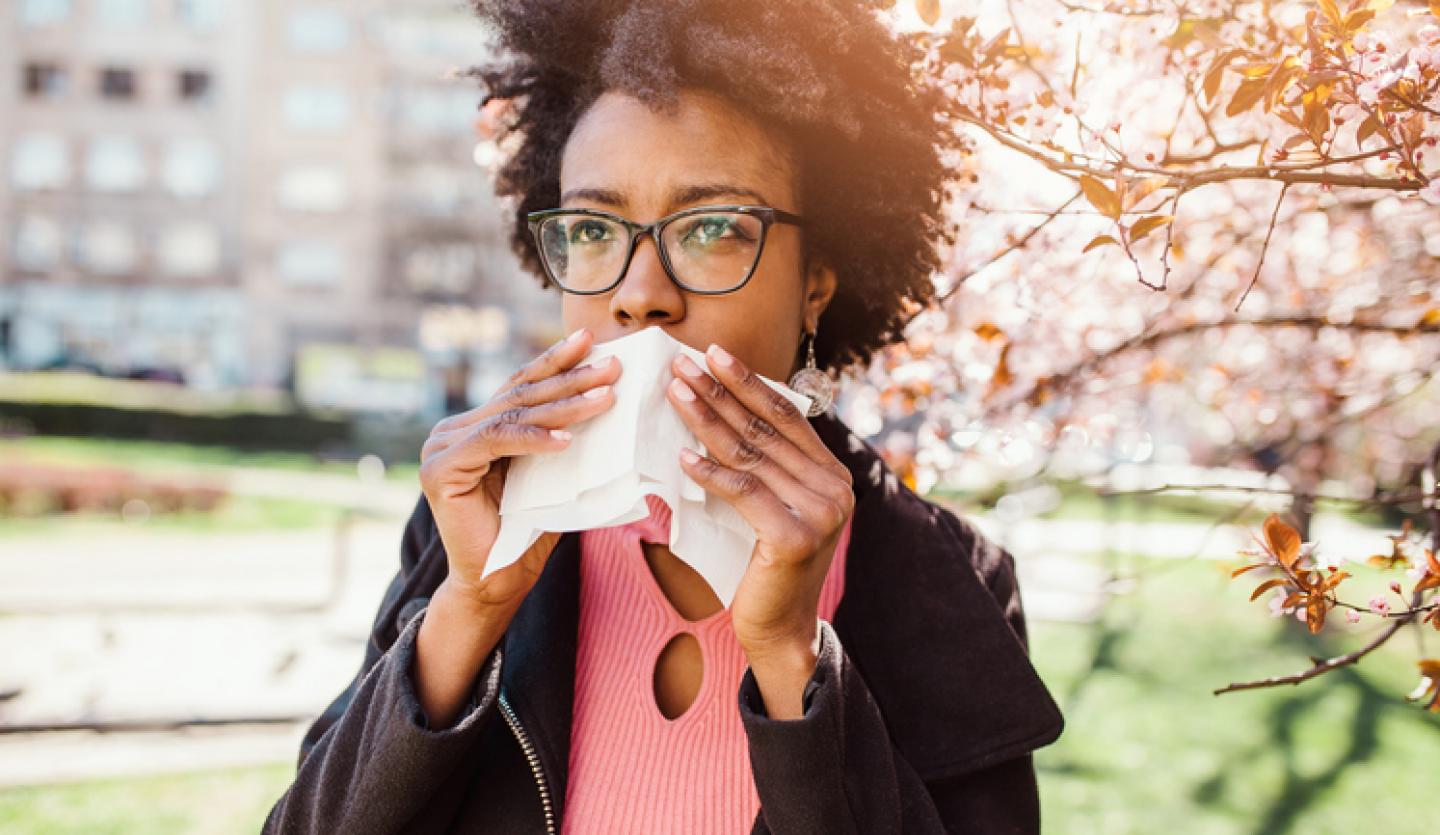“Allergic reactions can range from mild to life-threatening,” said Derek Mattimoe, MD, Catholic Health Family Medicine Physician. “Knowing more about allergic reactions—the causes, symptoms and treatments—can help prevent them and ensure your safety and that of others if they occur.”
What is an allergic reaction?
An allergic reaction happens when your body’s immune system overreacts to a harmless substance called an allergen. You can come into contact with allergens through your nose, skin, eyes, airway or digestive tract. You may experience respiratory, skin or gastrointestinal problems due to a chemical reaction between the allergen and your body’s immune system.
Mild allergic reactions cause only minor symptoms, such as the itchy eyes and runny nose that come with hay fever. Severe, sometimes life-threatening reactions can cause difficulty breathing and a swollen tongue and require immediate medical attention.
“Allergies can affect people of any age, gender or ethnicity,” said Dr. Mattimoe. “But you are more likely to develop allergies if your biological parents have allergies.”
What causes an allergic reaction?
Your immune system makes specialized cells called antibodies that destroy harmful germs. Sometimes, your body identifies a harmless substance, like pollen or pet dander, as a threat. The first time you become exposed to the allergen, your body makes an antibody specifically designed to destroy the allergen. When you reencounter the allergen, the antibodies release chemicals that trigger an allergic reaction.
“You may not react the first time you are exposed to an allergen, but over time, you become more sensitive to it,” said Dr. Mattimoe. Even minor exposures can start an allergic reaction.
What are common allergens?
Common allergens include:
- Cockroaches
- Dust mites
- Foods such as cow’s milk, tree nuts, soy, fish, eggs and wheat
- Insect stings
- Latex
- Medications
- Mold
- Perfumes and household chemicals
- Pet dander (dead skin cells)
- Plants like poison ivy
- Pollen
What does an allergic reaction look like?
Allergic reactions can differ based on the type of allergen. Some reactions affect your skin or respiratory system, while others cause an upset stomach. Regardless of the cause, an allergic reaction will not cause a fever.
Any allergen has the potential to cause anaphylaxis after exposure.
What is anaphylaxis?
Anaphylaxis is a severe allergic reaction with symptoms including:
- Difficulty breathing or swallowing
- Dizziness or fainting
- Flushed or pale skin
- Low blood pressure
- Nausea, vomiting or diarrhea
- Rapid and weak pulse
- Skin reactions, including hives, itching and cold to the touch
- Swollen face, mouth, throat or tongue
- Wheezing
Call 9-1-1 immediately if you or someone around you is experiencing these symptoms.
What are the symptoms of a food allergic reaction?
Food allergy symptoms usually occur within a few minutes to two hours of eating.
Common symptoms include:
- Abdominal pain, including diarrhea, nausea or vomiting
- Difficulty breathing
- Dizziness
- Nasal congestion
- Skin reactions, including itching, hives or dry, scaly patches called eczema
- Swelling of your lips, face, tongue or throat
- Tingling or itching in your mouth
- Wheezing
“Some food allergies, such as peanut or tree nuts allergy, fish allergy or dairy allergy, can trigger anaphylaxis that requires immediate medical treatment,” said Dr. Mattimoe. “If you have one or more of those allergies, talk to your doctor about safety precautions you must take to reduce exposure and ingestion of the allergen.”
What are the symptoms of an inhalant allergic reaction?
Inhalants are substances you breathe into your body, such as pollen, dust mites and pet dander.
Common symptoms include:
- Itchy or watery eyes
- Runny or stuffy nose
- Sneezing
If you have asthma, inhalant allergens can worsen your symptoms, possibly triggering wheezing or shortness of breath.
What are the symptoms of a medication allergic reaction?
Over-the-counter or prescription medications can cause allergic reactions. Antibiotics, insulin, chemotherapy, and painkillers, like ibuprofen and acetaminophen, are common triggers.
Common symptoms include:
- Itchy skin
- Shortness of breath
- Skin rash or hives
- Swelling
What are the symptoms of a latex allergic reaction?
Some people develop latex allergies after repeated contact with natural rubber. Skin irritation is the most common symptom of a latex allergy, and it occurs within minutes of exposure. Some people also experience:
- Difficulty breathing
- Hives
- Itchy nose
What are the symptoms of an insect sting allergic reaction?
Bees, ants, wasps and hornets inject poison into your skin when they sting you, which causes some people to have an allergic reaction.
Common symptoms include:
- Pain
- Redness
- Swelling
- Hives
- Itching
“Similar to food allergies, some people can experience anaphylaxis if they get stung by an insect, which requires immediate medical attention,” said Dr. Mattimoe. “Talk to your doctor about safety measures you must take if you are stung.”
Can I get tested for allergies?
Your primary care physician (PCP) may recommend a blood test or refer you to an allergist for more specialized testing.
What are the treatment options for allergies?
Treatment options can include medications and allergy shots. For those prone to experiencing a severe allergic reaction, especially anaphylaxis, your doctor can prescribe a self-injectable epinephrine medication (EpiPen®) that immediately provides relief while waiting for medical attention.
Your doctor may also recommend that you wear a medical alert bracelet to receive proper medical treatment if you cannot communicate.
“If you are diagnosed with an allergy that could lead to a severe allergic reaction, routinely check in with your doctor to review your treatment plan is working,” said Dr. Mattimoe.





